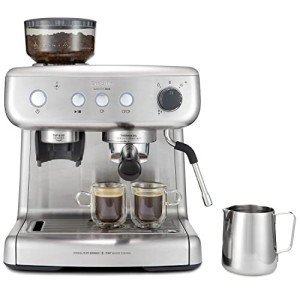The World of High-Quality Espresso Machines: A Comprehensive Guide
Espresso has ended up being a precious beverage amongst coffee lovers worldwide, known for its abundant flavor, extreme fragrance, and adaptability. The heart of a fantastic espresso lies in the machine used to brew it. High-quality espresso machines are developed to provide the perfect shot, making them a necessary financial investment for coffee enthusiasts. This post checks out numerous types of high-quality espresso machines, their functions, upkeep pointers, and responses to frequently asked questions.
Kinds Of High-Quality Espresso Machines
High-quality espresso machines fall into a number of classifications, catering to different choices, ability levels, and budgets. The main types include:
| Type of Machine | Description | Perfect User |
|---|---|---|
| Manual Espresso Machines | Requires user ability to manage extraction and pressure. Offers the most control over the brewing procedure. | Experienced baristas and enthusiasts |
| Semi-Automatic Machines | Combines manual operation with automation. Users manage the grind and tamping, while the machine manages water dispersion. | Intermediate users |
| Automatic Espresso Machines | Automate the developing procedure, allowing for programmable brewing times and temperature levels. | Casual coffee drinkers |
| Super-Automatic Machines | Have built-in grinders and are fully automated, handling whatever from grinding to developing and steaming. | Users seeking benefit |
| Commercial Espresso Machines | Designed for high volume use in coffee shops and dining establishments, using resilience and speed. | Company owner |
Comprehensive Overview of Each Type
Manual Espresso Machines
- Pros: Complete control over the brewing process; can produce extraordinary quality espresso.
- Cons: Requires considerable ability; time-consuming.
Semi-Automatic Machines
- Pros: Balanced control, mixing manual and automatic processes; superior quality espresso is still achievable.
- Cons: Requires some knowledge and experience to master.
Automatic Espresso Machines
- Pros: User-friendly; minimizes the learning curve while still producing high-quality espresso.
- Cons: Still needs some understanding of coffee-making basics.
Super-Automatic Machines
- Pros: Maximal benefit; little skill needed; suitable for people or families who want coffee without difficulty.
- Cons: Higher rate point; might do not have the fine-tuning capabilities of manual machines.
Commercial Espresso Machines
- Pros: Built for longevity and efficiency; typically includes features for high-volume turns.
- Cons: Expensive; might be overkill for home use.
Secret Features to Consider
When looking for a high-quality espresso machine, numerous crucial functions need to be taken into consideration:
- Pressure and Pump Type: Look for machines with a minimum of 9 bars of pressure, which is vital for drawing out the very best taste from coffee beans.
- Boiler Type: Single, double, and heat exchanger boilers each impact how the machine performs and the speed of brewing.
- Build Quality: High-quality materials such as stainless steel are more suitable for resilience and aesthetic appeals.
- Alleviate of Use and Cleaning: Some machines need comprehensive cleansing, while others are designed for simple upkeep.
- Temperature Control: Consistent temperature is vital; think about machines with PID controllers for exact control.
Advantages of High-Quality Espresso Machines
Investing in a high-quality espresso machine offers a multitude of benefits:
- Superior Quality: High-end machines enable for greater control, resulting in more delicious espresso.
- Durability: Built to last, quality machines require less repair work and replacements.
- Customization: Users can delight in a customized experience by changing grind size, shot timing, and other settings.
- Increased Convenience: Automatic and super-automatic choices enable enthusiasts to take pleasure in espresso with very little effort.
Upkeep and Care for High-Quality Espresso Machines
To keep an espresso machine working optimally, routine maintenance is essential. Here are pointers for preserving a high-quality espresso machine:
Descale Regularly:
- Use a descaling solution every couple of months to avoid buildup of minerals from water, which can affect taste and performance.
Tidy the Brew Group:
- For machines with a detachable brew group, clean it frequently to ensure a tidy extraction.
Change Water Filters:
- Use a water filter and alter it as needed to decrease pollutants in your developing water.
Daily Cleanings:
- Rinse the portafilter and group head after each use to avoid oil accumulation.
Keep an Eye on the Parts:
- Monitor seals, gaskets, and other parts for wear and tear and change them as required.
Often Asked Questions (FAQs)
1. What is the very best espresso machine for beginners?
For newbies, a semi-automatic machine frequently supplies a great balance of functionality and control, enabling users to find out the skills required for making fantastic espresso.
2. Are super-automatic machines worth the financial investment?
Yes, for those who focus on benefit and ease over control, super-automatic machines can be a deserving financial investment, especially for families or hectic professionals.
3. Just how much should I expect to invest in a high-quality espresso machine?
High-quality espresso machines vary substantially in price, with manual machines starting at a couple of hundred dollars, while super-automatic or commercial machines can exceed numerous thousand.
4. Can I make other coffee drinks with an espresso machine?
Yes, many espresso machines have steam wands or accessories that allow users to develop lattes, cappuccinos, and more.
5. For how long do espresso machines usually last?
With appropriate maintenance, high-quality espresso machines can last over a decade, making them a long-lasting financial investment in your coffee enjoyment.
High-quality espresso machines yield a transformative coffee experience, whether taken pleasure in at home or in a commercial setting. By comprehending Top Espresso Machines , their functions, and the upkeep needed to keep them running efficiently, customers can make informed choices that raise their coffee-drinking experience.

